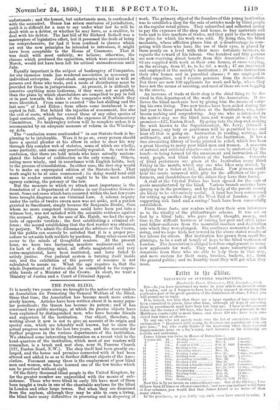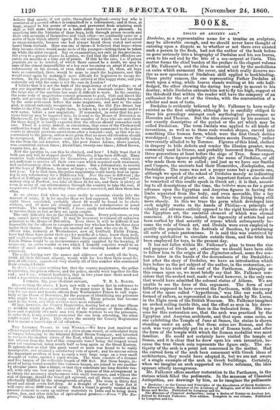Ertttr to tlJt allot . .
TREATMENT OF JUVENILE DELINQUENTS.
Hardwieke Court, Gloucester, 17th November, ISGO. Sin—As you have mentioned my name in your article on juvenile crime in London, and as I happen to have been lately engaged in studying this particular part of the great question of the diminution of crime, I trust you will permit me to reply.
It is, indeed, too true that there are a large number of boys who have been committed to prison, time after time, although all hope of amending them by punishment must have been lost long ago. I have at this moment before me the names of 168 boys, who have been convicted generally in the Middlesex courts eight or more ames, and above 450 who have been con- victed four times or oftener. To any one who not merely reads over the list of convictions with the exclamation " llardened little scamp, he deserves any punishment you can give him ; " but who really thinks of the hardening effect these repeated imprisonments have on a boy's mind, such histories as the following are terrible and saddening. James Adams was twice in House of Detention-
9 years old. 3d .. Stealing iron June 25,,1835 3 months. 9 „ 4th.. Assault Dec. 1, 1 month. 9 ,, 5th.. Found in a loft Feb. 2, 185G 3 months. 11 ,. 6th.. Stealing a top June 3, 3 weeks, chipped.
11 ID 7th.. Throwing stones Nov. 15, 7 days.
10 „ 8th.. Stealing a pipe Dee. 17, 3 days, whipped.
11 n 9th.. iron Stealing s Jan. 12, 1857 2 months. 1111th. Assaulting constable Mar. 19, 7 days 12 .,.• 12th, Stealing a till may 25, 3 months.
12 , 13th. Stealing a handkerchief Nov. 21, 1857 9 months. 12 ', 14th. Stealing meat Feb. 24, 1858 14 days, whipped. 15 ,,, 15th. Trespassing May 29, 3 months.
16' 16th. Stealing fruit Aug. 31, 14 days. 17 :• 17 th . Ditto Sept. 16, 7 days. 16 ,. 18th. Gambling May 12, 1859 11 days.
Now this is by no means an extraordinary case. Out of the 163 boys, I see 65 have been 12 times or oftener convicted ; and were you inclined to till three or four columns, you would find that James Adams is no worse off than many others.
In the provinces, as you justly say, such cases have ceased to exist. I believe that nearly; if mot -guite, throughout England—every-boy who is convicted of a second-offence is-committed to a reformatory, and• is thus; at least, stopped in his-career of crime, and prevented -from attaining such skill as will make thieving its a habit .either lucrative or. pleasant. In searching into the histories of these goys, both through prison record* and their own accounts of themselves and each-other—we constantly come on a series of facts which utterly upsets the old notions' which one had received as unquestionable, because one had always heard them stated and never heard them doubted. Here was one of them-1 believed that boys—when they became clever, would make tools of the younger—letting them be taken, up while the elder escaped. But on examination, not only in the provinces, but even to a greater degree in London, we And that the oldest offenders are rarely six months at a time out of prison. If this be the case i.e. if prison journals are to be truated, of which there cannot be a 'doubt, we may be sure of the almost impossibility of a boy ever becoming an adept if sent to a reformatory on his second, or even third conviction. If, then, all boys were so committed, there would be none to teach the beginners, and this would react again by making it more difficult for beginners to escape de- tection. In the provinCes, things have arrived at this happy state; and you naturally ask why the same is not the case in London ? I believe that it is not the fault of the magistrates or of the police ; or of any one department of those whose duty it is to diminish crime; but that the large size of the machine has made it difficult to work. In the country, the same body of magistrates commit prisoners to gaol, visit and direct the gaols, and govern the police. An offender, twice convicted, probably brought by the same policeman before the same magistrate, and sent to the same gaol, is almost certainly recognized. In London, the Old Pye Street boy walks to the City, and if caught there, is taken by a new policeman under a new name, before a. new magistrate. If remanded, in order that his pre- vious history may be inquired into, he is sent to the House of Detention in Clerkenwell, for three days—but in the number of boys who are sent there for three days; it is hardly expected that the officers should remember each one. There is a story, indeed, in circulation, that some of the Clerkenwell authorities found that the officers were constantly summoned to the police courts to identify previous convictions after a remand—and, as this was in- convenient to the prison, orders were given that no more old offenders should be recognized. This of course could not be true, but it has evidently taken its rise from the sad number, who, like poor James Adams, above quoted, was committed sixteen times; David Cain, twenty-one times; Alfred Brown, twenty-two, &c. &c. Now the question is, can this be checked, and how ? I fully trust that it both can and will be stopped shortly. Hitherto, it has been difficult. Many counties built reformatories for themselves, at moderate cost, which were yet sufficient to receive all their own cases which required such treatment, and unfortunately often took in many more. But a reformatory, to receive all the boys of Middlesex, became so large a work, that it was only opened last year. Up to that time, the police magistrates could rarely find an open- ing in any reformatory for a Middlesex boy. Note the case is different ; the school at Teltham can take all boys under fourteen, the "Cornwall" refor- matory ship at Purfleet, can take all those fit for sea, and there is plenty of room in many of our reformatories through the country to take the rest, if magistrates will begin by sending those oftencst convicted, and then those less often.
As we always find when we conic really to examine. closely into the amount of crime, it is far smaller than we had supposed. Of the 168 boys eight times convicted, probably about 40 would be found to be above sixteen, and 40 more are already sent either to reformatories or penal servitude. The remaining 90 will, I know, easily find reformatories ready to receive them as fast as they are again caught. The only difficulty lies in the identifying them. Every policeman, as you say, cannot know every thief. It may be necessary to remand all unknown prisoners to the House of Detention. Even there it will be difficult if not impossible for the officers to recognize every boy who has been for three days under their charge. But there are another set of men who can do it. The officers who, formerly at Westminster, now at Coldbath Fields Prison, have had these boys under their eye for months at a time, know them well, and could recognize them at once. Their frequent absence from Coldbath Fields Prison would be an inconvenience easily supplied by the keeping, if necessary, an extra warder or two which I humbly conceive would be an outlay of small account, compared with the clearing London of young criminals.
The police having now the names and addresses of nearly all the boys, (with all their different aliases), would with far less than their usual de- gree of efficiency, apprehend very shortly all of this number who continued their criminal habits.
In short, it requires nothing but that the county magistrates, the police magistrates, the prison officers, and the police, should work together for this end ; and I say, without hesitation, that in two years time there need not exist a four-times convicted boy in London.
I remain, Sir, your obedient servant, T. B. L. BAKER.
Since writing the above, I have met with a curious fact in reference to the absurd canard above mentioned. For many years it has been the cus- tom for our male and female officers from Westminster Prison to call regu- larly at the House of Detention, for the purpose of identifying any prisoners who might have been previously convicted. These persons had become used to the work, and their services were most valuable. Of late, however, the County Magistrates, fearing lest at any time illness or accident might deprive the county of the advantage of these officials, have sent regularly two male and two female warders to see the prisoners, in order that, if any accident prevented the one from attending, the other might supply his place. This shows the anxiety the County Magistrates feel to insure a knowledge of old offenders.
THE LONGEST Vessel-. IN THE WORLD.—We have just received an official report of the performance of a river steam-vessel, or articulated train of barges, belonging to the Oriental Inland Steam Company, and intended to navigate the shallow rivers of the East, which possesses peculiar scien- tific interest from the fact of this composite vessel being the longest vessel ever yet constructed, being nearly half as long again as the Great Eastern. It appears that on trial this great vessel or train was found to be easily manageable, and attained a satisfactory rate of speed ; and its success solves the important problem of how to carry a very large cargo on a very small draught of water, against a rapid stream. The train consists of a steamer and five barges, of the collective length of 900 feet. But these barges, in- stead of being towed asunder like common barges, are joined to one another by gircular joints like a binge, so that they constitute one long flexible ves- sel, with only one bow and one stern. The purpose of this arrangement is to obtain the necessary displacement with small resistance, and without the risk of damagv, should the vessel get 'aground, and all these conditions are effectually fulfilled by the arrangements adopted. The train is thirty feet broad and about Berm feet deep. At a draught of water of three feet it will carry about 3000 tons of cargo. Such a vessel is greatly needed at the present moment to carry up railway materials in India and to bring down cotton, flax, and other articles of -agricultural produce.—From " The En- gineer," October 13th, 1860.



























 Previous page
Previous page